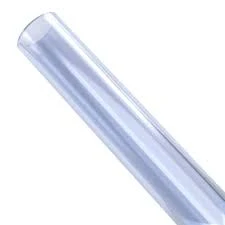dec . 30, 2024 21:39 Back to list
PVC Irrigation Pipes for Efficient Water Management in Agriculture and Landscaping
PVC Irrigation Pipes Revolutionizing Water Management in Agriculture
In today’s world, efficient water management is crucial for sustainable agriculture, especially as global populations rise and water scarcity becomes a pressing concern. One of the significant innovations that have emerged in this arena is the use of PVC (Polyvinyl Chloride) irrigation pipes. These pipes have revolutionized irrigation practices, enhancing water distribution efficiency and promoting better crop yields.
Understanding PVC
PVC, a synthetic plastic polymer, is known for its durability, chemical resistance, and versatility. It is widely used across various industries, but its application in irrigation is particularly noteworthy. The physical properties of PVC make it an ideal choice for irrigation pipes. It is lightweight, easy to handle, and can withstand a range of environmental conditions, including varying temperatures and humidity levels.
Advantages of PVC Irrigation Pipes
1. Durability and Longevity One of the most significant advantages of PVC irrigation pipes is their long lifespan. These pipes can last for several decades without significant deterioration. Unlike metallic pipes, which can corrode over time, PVC pipes are resistant to the corrosive effects of water and soil chemicals. This durability translates into lower replacement costs and less frequent maintenance, a boon for farmers.
2. Cost-Effectiveness PVC pipes are relatively inexpensive compared to other materials such as metal or concrete. Their low initial cost, combined with their durability, makes them a cost-effective choice for irrigation systems. Furthermore, their lightweight nature reduces transportation costs, making them accessible to farmers of all scales.
3. Easy Installation The lightweight design of PVC pipes also simplifies installation. They require fewer labor hours to install than heavier materials, and their modular design allows for easy customization and expansion of irrigation systems. This flexibility is particularly helpful for farmers who may need to adjust their irrigation systems to accommodate changing crop needs or to expand their operations.
pvc irrigation pipe

4. Reduced Water Loss Efficient irrigation is essential for maximizing crop yields, and PVC pipes contribute significantly to reducing water loss through leakage. The smooth interior surface of PVC pipes minimizes friction, allowing for uniform water distribution and reducing the risk of blockages. This efficiency not only saves water but also ensures that crops receive the necessary moisture for optimal growth.
5. Resistance to Algae and Bacteria PVC pipes are less prone to algae and bacterial growth compared to other materials. This resistance is crucial in preventing contamination of the irrigation water, ensuring that crops stay healthy and reducing the risk of diseases that could impact yield.
Environmental Benefits
Adopting PVC irrigation pipes also benefits the environment. By optimizing water usage, PVC systems help conserve this precious resource, ensuring that more water is available for other critical needs. This efficient management of water resources is vital in regions experiencing drought or limited water supplies. Moreover, the longevity of PVC pipes means fewer resources are consumed in production, transportation, and disposal over the years.
Future of PVC in Irrigation
As technology advances, the potential for using PVC in irrigation systems continues to grow. Innovations such as smart irrigation systems that incorporate sensors and automated controls are becoming commonplace. Integrating these technologies with PVC pipes could enhance the efficiency and effectiveness of irrigation practices even further.
Conclusion
PVC irrigation pipes embody a significant advancement in agricultural water management, offering numerous benefits including durability, cost-effectiveness, and improved efficiency. As farmers continue to face the challenges of water scarcity and climate change, embracing PVC technology can play a crucial role in ensuring sustainable agricultural practices. By adopting these innovative irrigation solutions, farmers can optimize their water usage, boost crop yields, and contribute to a more sustainable future.
-
Durable PP Rigid Sheet: Lightweight, Chemical Resistant Solutions
NewsAug.21,2025
-
PVC Grey Sheet for Extraction: Chemical Resistant & Durable
NewsAug.19,2025
-
Durable PVC Pipe Fittings for Plumbing & Irrigation Needs
NewsAug.18,2025
-
HDPE Steel Belt Reinforced Spiral Corrugated Pipe | High Strength
NewsAug.17,2025
-
HDPE Pipe Fittings: Durable, Leak-Proof Solutions
NewsAug.16,2025
-
Premium CPVC Sheet: High-Temp & Chemical Resistant Solutions
NewsAug.15,2025

